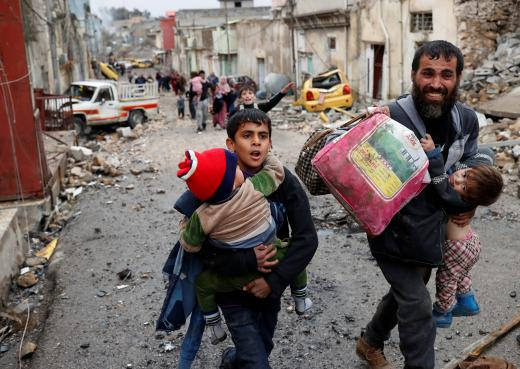“U.S. Investigating Mosul Strikes Said to Have Killed Up to 200 Civilians.”
This is a headline by the New York Times. It read oddly to me the first time, and after reading and rereading it a few times, I realized why: This paints a vastly different picture than the story that it tells.
If a completely uninformed person were to read this headline, they might think that this was referring to Mosul airstrikes attacking civilians in the United States, who were now investigating the attack. Because why would the same country who performed the attack be said to investigate it?
Like many of us, I’ve realized the harm in America being painted behind rose-tinted glasses, while other countries go up in flames.
These terrorist attacks have just as much of an impact on these countries as 9/11 did on ours—whether or not we share a religion, a mosque, a temple, or a church.
It seems as though the higher authority figures in America manage to dehumanize others through word choice to make our “triumphs”—which are really gas attacks, missiles, and bombs—acceptable to the general public.
We share the same humanity, but these stories pretend as though the only people worthy of it are in our in-group: American citizens.
America has an agenda, and that is to fight against the so-called Islamic State, and we are doing so ruthlessly, at the expense of thousands of innocent people. If we look at this objectively, we are guilty of using the same tactics that we are fighting against.
I know it’s easier to look away. I was raised in a family that never wanted me to feel sad or hurt, so we spent a lot of time looking away. But as I’ve grown into my own, I’ve realized that I can’t anymore. I can’t look away from the homeless, or the sick, or the poor, and now, from the innocent civilians dying because of the changing political climate.
On March 22, 2017, hundreds of innocent civilians in both Mosul, Iraq and Syria were murdered by American-led airstrikes. When 9/11 happened, thousands died, and America was never the same. We built a monument and continued to weep for years on end, and rightfully so. Meanwhile, these occurrences are happening in third world countries every single day, and no monuments stand in the place of those lost.
America experienced this trauma, and yet we are now inflicting it, tenfold or more, on thousands of people not even involved in the attacks—people who are now experiencing the same kind of suffering on a larger scale. This all feels like a total disregard for humanity.
I won’t get philosophical or talk about my ideas on fighting fire with fire. But, I also won’t deny that I have a vastly different view on the way that we should live together and how we can love each other in our everyday lives. The best we can possibly do is to stop dehumanizing each other, starting with the homeless people that live down the block from us.
I don’t work on campaigns. I’m not a canvasser. I’m barely involved in local politics. My contributions are personal. I offer company and food to the homeless. I volunteer at battered women’s shelters. I’ve helped displaced children find homes. I’ve given tampons and towels to 15-year-olds who’ve lost their parents. I devote my life to sitting in a room and working with people who feel like they have no hope left to live. I save toddlers from being raped. I feel a call to action in writing this because the people being killed are the same people that I work with.
So you may think, who am I to type up my convictions about the way the media portrays our country and the actions that we take to “protect” ourselves?
But the truth is, while hundreds of civilians are dying, we must remember that we are all interacting with the same kinds of people, every single day. These civilians are us, and we are them. We may only perceive our immediate and extended families as our own because our minds can only expand so far, but we really are one big family. Science has proved it.
I didn’t choose to be born into a country that is just as much a culprit as the ones that it condemns. None of us did. So it’s our jobs to reframe the way we tell these stories about each other. In America particularly, I see words, chosen by the media and politicians, which condemn in order to justify—I see our leaders committing murder and calling it hope.
I can’t imagine that the bigger, stronger man wins the fight, because he still suffers. Only those compassionate enough to save him might, because they may stop him from committing such violent acts in the first place.
I may not know all of the details involved in bills, executive orders, or even the law, but I do know human nature. I know that a perpetrator is more than likely a victim. I know that it is an easy defense mechanism to make ourselves look innocent when we’re at fault. I know that rather than owning our own pain, we often come back and inflict it on those who hurt us.
So I’ll say this—there is no not being involved in politics. If we are alive and we live in a country, we are involved because we exist. Politics exist in our everyday lives.
We don’t have to make monumental changes to public policy or be a leading figure in a well-established organization to make a difference in the world. I think we can make a difference in our everyday lives by changing the narrative and being honest with our children and with each other.
The cycle of violence and then peace is one we’ve seen over hundreds of thousands of years between tribes, communities, cultures, and entire countries, but when will it end? I’m not imagining a utopia as much as I am a community that breaks the norm and takes off the rose-tinted glasses. One that replaces them with a realistic outlook that sustains our Earth and our survival. The truth that we’re all coming to learn is that our privacy isn’t always protected, free media is feeling much less than “free,” and there are conflicts of interest between businessmen on Wall Street and the U.S. government. This is not conspiracy. This is fact.
Some problems remain unresolved for decades, with bloodshed and death permeating generations who may never learn that just because we are born into something, doesn’t mean we have to stand by it. Breaking the cycle starts at home with our own children, and outside of home with our own friends. It starts with rehumanizing the people we were told to be scared of or look away from.
It’s so important to interact with those who are different than us—people outside of the bubbles we’ve created for ourselves. It’s so important to discuss what is happening in the world at the dinner table, constructively. It’s so important to keep up with current affairs, both national and international. It’s so important to speak the truth in a time where we are being given “alternative facts.”
There is one fact that cannot be twisted or turned in any way: we share one finite planet in an infinite multiverse, one that has given us life. We only look or sound different because of where we were born and raised, and we don’t choose that. It’s our duty to tell our children that condemning others by catastrophic means is currently the norm, but that it should not be accepted.
The way we describe things to people who don’t know about them is critical to changing this norm. Tragedy is not hope.
We can make a change by simply changing the narrative, and not standing for anything but the truth.
~
“They will learn one day, after too many fall before, that words are stronger than ever credited. That the bold black of typed text and stained fingers from honest words leaked on simple pages is braver and can shift the balance of power and promise and catalyze courageous change more than the blood red stains on tired streets, the bullet shells of censored thought and misunderstood gospel or confused canon. That the sound of poetry will echo louder than rushing feet and screaming voices and explosions shaking morning prayers. Don’t we know by now, don’t we see that their god is your god and yours is mine and we all will die with the same bruises in the same spots on our knees; kneeling, we are all the same distance from whatever heaven we believe in.” ~ Tyler Knott Gregson
~
I am open to mindful discussion—I actually hope for it—so feel free to comment if you’d like to continue the conversation.
~
Image: Ashley West/ Flickr
Editor: Khara-Jade Warren









Read 1 comment and reply